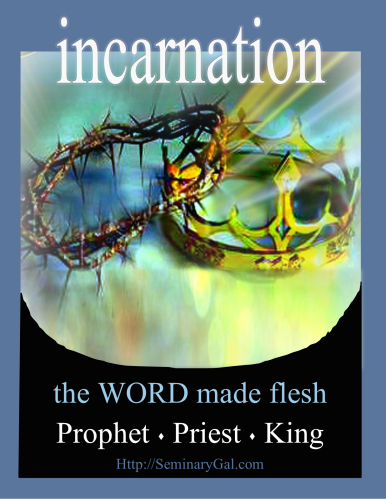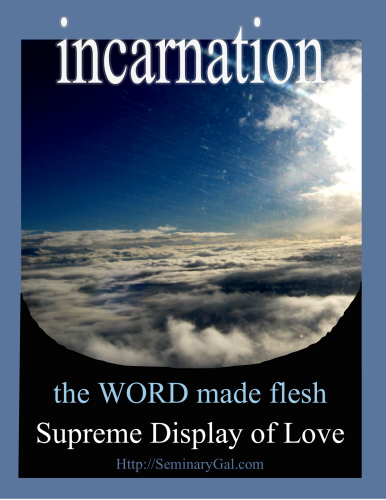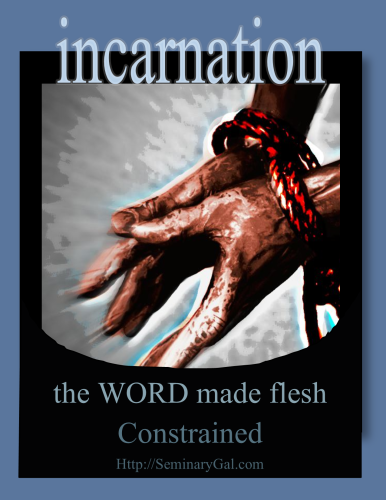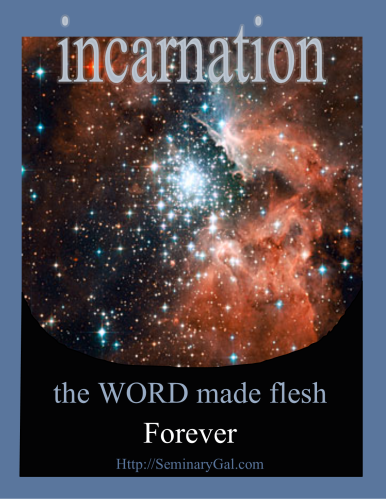 The Incarnation wasn’t just something decided upon in the Trinity somewhere in the upper atmospheres and then dropped onto us on earth for our benefit. There was something earthly in it for God, too. It was practical and hands-on.
The Incarnation wasn’t just something decided upon in the Trinity somewhere in the upper atmospheres and then dropped onto us on earth for our benefit. There was something earthly in it for God, too. It was practical and hands-on.
It was God’s avenue to being Prophet, Priest, and King…offices of relationship that belong to this world for the sake of men.
God didn’t need to be a prophet, priest or king within the Trinity. The Godhead is complete within itself.
God gave us prophets so we’d hear from him accurately.
God gave us priests so we would learn how to worship Him rightly.
And God wanted to be our king, but sadly, we were not content with that.
1 Samuel 8:1 When Samuel grew old, he appointed his sons as judges for Israel…3 But his sons did not walk in his ways. They turned aside after dishonest gain and accepted bribes and perverted justice. 4 So all the elders of Israel gathered together and came to Samuel at Ramah. 5 They said to him, “You are old, and your sons do not walk in your ways; now appoint a king to lead us, such as all the other nations have.” 6 But when they said, “Give us a king to lead us,” this displeased Samuel; so he prayed to the LORD. 7 And the LORD told him: “Listen to all that the people are saying to you; it is not you they have rejected, but they have rejected me as their king. 8 As they have done from the day I brought them up out of Egypt until this day, forsaking me and serving other gods, so they are doing to you.
That is one of the most depressing passages in the Bible, ranking right up there with the decision to rebel against God in the first place and eat the fruit of the tree of knowledge of good and evil in the Garden of Eden. We are forever making bad choices and on our own, we’re likely to get the worst of humanity: false prophets, fraudulent priests, and failed kings. Because we rejected hearing from God, worshiping Him rightly, and serving Him as our King, we gave up on having God’s presence in our world and a relationship with Him.
The Incarnation, however, made this Prophet, Priest, and King accessible in Jesus. He was a man and therefore someone we could relate to. And yet He is God so there’s nothing false, fraudulent, or failed about Him. God restored our proper relationship, communication, worship, and service and He did it all through the Incarnation.
Thought for today: The Incarnation was God’s avenue to accommodate us, to give us an accessible leadership, a perfect shepherd, and a King of kings and Lord of lords worth serving.
Questions for reflection:
- There is relationship within the Trinity. Why should it matter to God that mankind has a Prophet, Priest, and King in Jesus?
- Thinking about relationships, what does a Prophet bring to us? What about a Priest? What about a King?
- How did the Incarnation of Jesus (Emmanuel, God with us) bring us into a new relationship with Him?
 In the Incarnation, there was a little insider stuff going on in the Trinity.
In the Incarnation, there was a little insider stuff going on in the Trinity. 

 Because they define it as being basically a temporary form change, a morphing, avatar, or visitation, they are able to suggest that many world religions have gods who have been incarnated. Some suggest that the Pharaohs were incarnations of gods. All kinds of beings get all kinds of bodies.
Because they define it as being basically a temporary form change, a morphing, avatar, or visitation, they are able to suggest that many world religions have gods who have been incarnated. Some suggest that the Pharaohs were incarnations of gods. All kinds of beings get all kinds of bodies. It’s not exactly like Peter Pan fighting man-to-man and refusing to do what was within his power (i.e. flying) to save his own life. It is even more than Pan’s self-decision… for self-restraint. Yet, Jesus had divine power as the Eternal Word. Powerful enough to create the entire universe with it. In the Incarnation, though, His human body had certain limitations without leaving Him powerless.
It’s not exactly like Peter Pan fighting man-to-man and refusing to do what was within his power (i.e. flying) to save his own life. It is even more than Pan’s self-decision… for self-restraint. Yet, Jesus had divine power as the Eternal Word. Powerful enough to create the entire universe with it. In the Incarnation, though, His human body had certain limitations without leaving Him powerless. The Incarnation was a very costly move.
The Incarnation was a very costly move. Think about that statement for a moment.
Think about that statement for a moment. significance that Jesus IS the very Image of God?
significance that Jesus IS the very Image of God? Okay, that’s pretty weird.
Okay, that’s pretty weird.